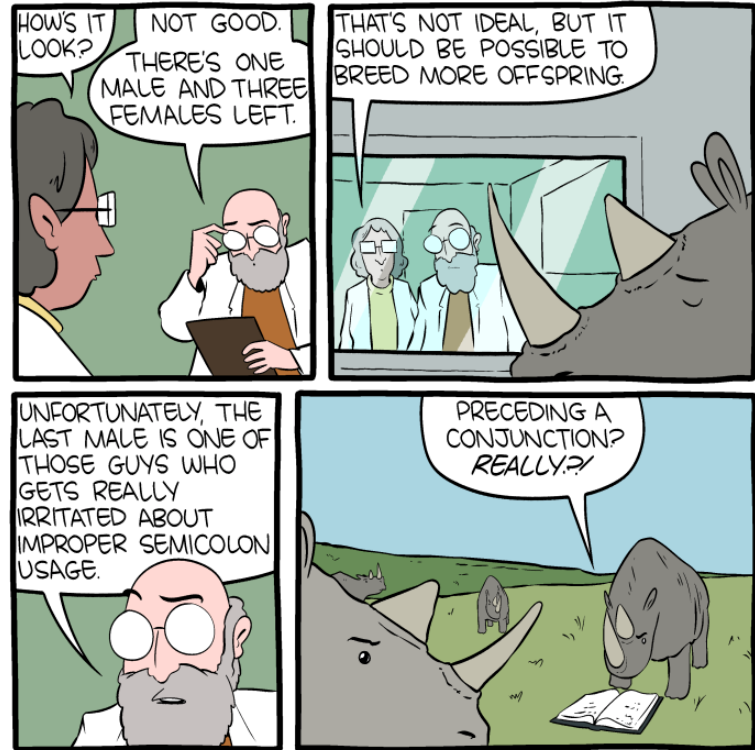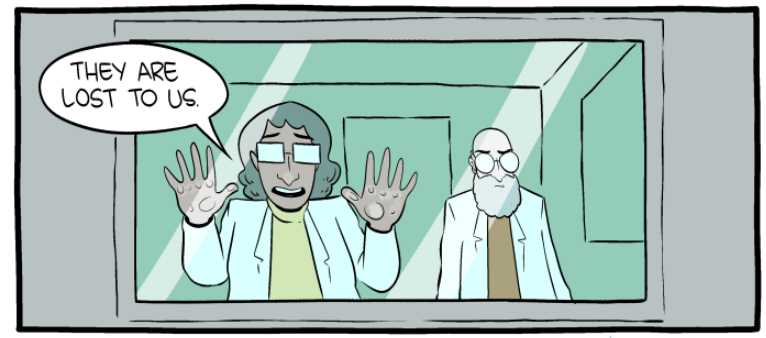Peeving and breeding
« previous post | next post »
Today's SMBC explores an important issue:
My impression is that this is an area where the principles of assortative mating apply — but with a population of four, the odds might be unfavorable.
Update — "Sudan, last male northern white rhino, dies in Kenya", BBC News, 3/30/2018.


D.O. said,
March 4, 2018 @ 9:19 am
You forgot to mention that ellipses saved the day…
Geoffrey K. Pullum said,
March 4, 2018 @ 9:26 am
The females are basically right not to contemplate mating with him, in my view. Total number of semicolons followed by one of the four main "conjunctions" (and, but, or, nor) in the Wall Street Journal corpus: 6,033. Probably a slight overcount, because WSJ unfortunately contains some duplicated articles, but say 6,000. Where do elderly male rhinos, Daily Telegraph readers, and other self-anointed grammar and punctuation buffs get their inaccurate information about usage? What exactly would convince the typical elderly male rhino if facts of this sort are ruled irrelevant?
Andrew said,
March 4, 2018 @ 9:26 am
Panel 3 should of course read ".. one of those guys who GET really irritated…". Or is this a lost cause?
Pflaumbaum said,
March 4, 2018 @ 11:04 am
Looks like Andrew's not breeding any time soon.
Eleanor said,
March 4, 2018 @ 12:26 pm
"Where do elderly male rhinos, Daily Telegraph readers, and other self-anointed grammar and punctuation buffs get their inaccurate information about usage?"
Their old schoolteachers (who also told them always to type two spaces after any terminal punctuation).
Richard Hershberger said,
March 4, 2018 @ 1:05 pm
"…(who also told them always to type two spaces after any terminal punctuation)."
This is a different animal. I am an double-spacer myself. It would never occur to me to complain, or even to notice, that someone else is single-spacing. I just want to be left to double space in peace. It is the single-spacers who peeve about this. And when my schoolteacher taught me to double space, it was in fact current accepted best practice. The single-spacers are like the that/which peevers. They have declared by fiat a new rule, and now criticize anyone who doesn't follow their whim.
Stephen Hart said,
March 4, 2018 @ 3:16 pm
"Their old schoolteachers (who also told them always to type two spaces after any terminal punctuation)."
If their old schoolteachers we're teaching typing, two spaces is correct. Monospaced type (on typewriters) vs. proportional spaced type (computers)
https://en.wikipedia.org/wiki/Monospaced_font
Topher Cooper said,
March 4, 2018 @ 4:00 pm
When I learned to type in the mid 60s, I was told that the reason for double spacing at the end of a sentence was because typesetters put additional space at the end of a sentence. At some later time (though now a time still decades past) I was told that typewritten text elsewhere used a single space and the reason was that the distance used by typesetters at the end of a sentence was about one and a half times the space placed between words within a sentence. Some communities chose to stretch that to two spaces with a typewriter and some chose to shrink it to one.
I haven't checked any formal sources about typesetting rules, but I pulled down a book of sufficient age that I judged that any effects of electronic typesetting were out of the question and any effects of the introduction of the typewriter on typesetting was unlikely. Specifically it was "The Science of Life" by H. G. Wells, Julian S. Huxley and G. P. Wells, copyright 1934 and published by The Literary Guild, in New York and printed by the Country Life Press of Garden City, N. Y. I picked out lines at random and compared the space between a full stop and the following letter to a random inter-word space on the same line (necessary because of justification). I did this 20 times, and each time the after sentence space was between one and two times the chosen space between words on the same line. This is hardly definitive, since it might have reflected something other than the inserted gap, for example, maybe the print had extra lead to the right of the very slender period. But I would say this makes that explanation for the different conventions plausible.
amandachen said,
March 4, 2018 @ 4:10 pm
>Where do elderly male rhinos, Daily Telegraph readers, and other self-anointed grammar and punctuation buffs get their inaccurate information about usage?
The Oatmeal?
Anthony said,
March 4, 2018 @ 4:37 pm
The world is too much with us; late and soon,
Peeving and breeding, we lay waste our powers;
Bartleby said,
March 4, 2018 @ 5:24 pm
@Anthony: Peeving, yes. But breeding? Well, maybe.
The expense of spirit in a waste of shame
Is lust in action . . .
Jerry Friedman said,
March 4, 2018 @ 5:55 pm
Prof. Pullum: You can see that rule at the University of Maryland University College's site.
Claims about right and wrong won't be disturbed by facts about usage. The only conclusion elderly rhinos will draw is that they're better at punctuation than the WSJ.
(What, me? I'm a Tolkien fan, so that isn't one of my peeves.)
Ralph Hickok said,
March 4, 2018 @ 6:10 pm
@Topher Cooper:
In the days of linotypes, there was no rule about how much spacing should follow the end of a sentence. However, in spacing out a line to right-justify it, compositors were taught to put more spaces at the end of a sentence than after words within a sentence rather than overdoing spacing between words. That accounts for the variability you found.
Topher Cooper said,
March 4, 2018 @ 6:14 pm
@Ralph Hickok
Makes sense. Thanks.
Viseguy said,
March 4, 2018 @ 6:35 pm
I guess the peeving rhino would also object to starting a sentence with a conjunction. But what does he know?
Rebecca said,
March 4, 2018 @ 7:35 pm
Why the assumption that Peeving Rhino is elderly? Other than the Kids Today contingent, does punctuation peeving skew elderly?
Speaking with the full freedom of ignorance, my impression is that there is a type that blossoms into peeverdom roughly in their 20s or 30s and remain there for life. Perhaps I am mistaken
ktschwarz said,
March 4, 2018 @ 9:18 pm
"If their old schoolteachers we're teaching typing" is a fantastic example of the kind of error discussed in the previous post, an error that can only be made in typing, never in speaking.
Ursa Major said,
March 5, 2018 @ 6:09 am
I'm surprised this persnickety rhino allowed himself an interrobang; but no-one ever said pedants weren't blind to everything except their pet peeves.
bratschegirl said,
March 5, 2018 @ 10:38 am
@ktschwarz: Siri often makes such errors while I'm using speech-to-text on an iThing, for example placing "you're" where "your" belongs, or alternating "will" and "we'll" pretty much willy-nilly. Do we count that as an error of typing, or of speaking, or as its own third category?
aka_darrell said,
March 5, 2018 @ 1:07 pm
Perhaps germane to some earlier comments note that Unicode has about 25 different spaces, for some reason.
Troy S. said,
March 5, 2018 @ 4:02 pm
I think Milton managed to precede nearly every conjunction in the English language with a semicolon in the just first book of Paradise Lost alone:
If he opposed; and with ambitious aim (41)
Reserved him to more wrath; for now the thought (54)
That comes to all; but torture without end (67)
High overarched embower; or scattered sedge (304)
In which they were, or the fierce pains not feel; (336)
Yet to their general’s voice they soon obeyed (337)
edwixt upper, nether, and surrounding fires; (346)
Till, as a signal given, the uplifted spear (347)
His own and Rhea's son like measure found; (513)
So Jove usurping reigned: these first in Crete (514)
With golden architrave; nor did there want (715)
Topher Cooper said,
March 5, 2018 @ 4:20 pm
@aka_darrell Different widths, some cause a word-break, some don't, some allow a line break, some don't, some are invisible (zero-width; for example, to allow line breaks), some act like word spaces for other non-latin character sets, even though they are not blank, etc.:
https://en.wikipedia.org/wiki/Whitespace_character#Unicode
This doesn't include everything, for example, although they list ideographic space (part of the CJK — Chinese, Japanese and Korean — character block) they don't include the Ethiopic Wordspace (looks like a ":"; Ethiopic is the rather large character set for the Ethiopic writing system — which is a writing system meant to cover most of the nearly 90 native languages spoken in Ethiopia and Eritrea).
Roger Lustig said,
March 5, 2018 @ 7:48 pm
What other animal could they possibly have used? The rhino's horns, looked at the right way, are a semicolon.
John Walden said,
March 6, 2018 @ 1:43 am
If I'd been the rhino I'd have been more taken aback by 'How's it look?'.
Robot Therapist said,
March 6, 2018 @ 4:07 am
Best thread-jack ever!
Kate Gladstone said,
March 6, 2018 @ 1:46 pm
Blind the male.; perhaps temporarily, staging it as the result of an accident. Then he can’t see any semicolons, but can still mate.
Chandra said,
March 6, 2018 @ 2:47 pm
Re. spacing after a period: Pff, who even uses periods these days
Robert said,
March 7, 2018 @ 4:18 pm
Simply approaching from the rear solves the problem, surely.